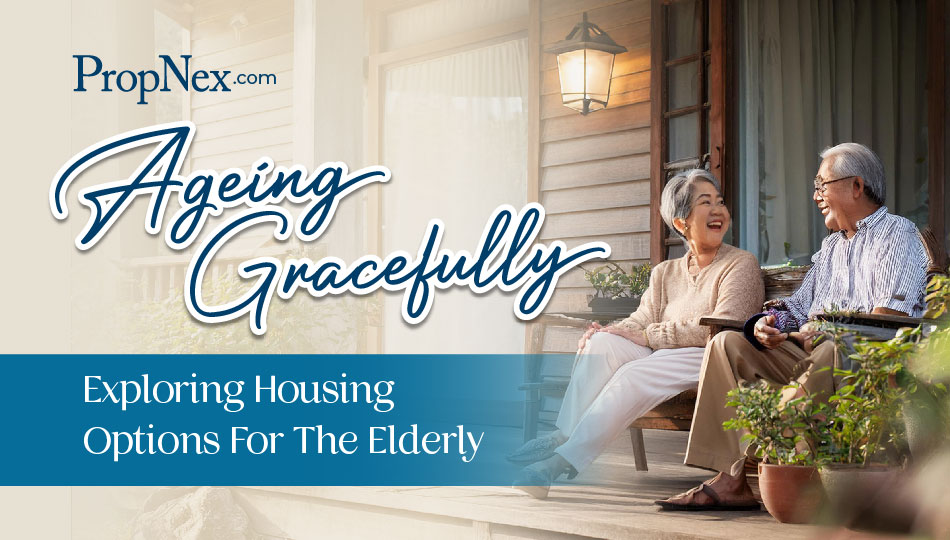
Sheena Sugiarto
Research Writer

Have you ever thought about where your parents will live once they hit their golden years? Will they stay with you, even after you are married? Or will they live on their own? And what about you? Have you considered your future? Will you live with your kids? Or maybe you're not planning on having any? What's the plan then?
Unlike in Europe, where around one out of three households can contain only one person, many elderly in Asia choose to live with their children because it's a big part of Asian culture. However, there is an increasing trend of living alone in many Asian countries including Singapore. Sim Ann, the Senior Minister of State, Ministry of National Development, said that the proportion of Singapore's population aged 65 years and above is rising rapidly, especially with the increasing life expectancy and low fertility rates. Sim predicts that one in four people will be in this age category by 2030. So the question is, how can we accommodate this group, particularly in terms of housing and community?
Traditionally, elders have few options if they don't have or don't want to live with family. One of the more obvious choices is to move into a senior living facility. The services provided by nursing homes or old folks' homes can vary from one facility to another. Typically they are categorised as follows:
- Independent Living
Independent living is for seniors who are fully capable of taking care of themselves. Unlike assisted living, there's no need for caregiving support. It's more about living in a community where they can enjoy an active lifestyle and connect with others their age. However, services like housekeeping may also be available. - Assisted Living
Assisted living provides a balance between independence and support for seniors. Residents live in their own apartments but receive help with daily tasks like bathing or medication. They can also enjoy activities and socialise with others, making it a great option for those who need a little care but still want to live mostly on their own. - Memory Care
Memory care is designed for seniors with dementia or memory issues. These specialised communities offer care for both mental and physical needs, providing therapies and support in a safe environment.
In general, the costs of nursing homes can vary from $1,200 to $4,500 depending on the facility. The Ministry of Health also provides subsidies known as Residential Long-Term Care (LTC) for Singapore Citizens (SC) and Permanent Residents (PR). The subsidy mostly applies to Voluntary Welfare Organisations (VWO) facilities, but some private facilities qualify for it too. Below is the breakdown.
| Monthly Per Capita Household Income | Subsidy Levels for Singapore Citizens (SC) | Subsidy Levels for Permanent Residents (PR) |
No PCHI | Annual Value2 ? $21,000: 75% Annual Value > $21,000: 0% | Annual Value ? $21,000: 50% Annual Value > $21,000: 0% |
$800 and below | 75% | 50% |
$801 to $1,200 | 60% | 40% |
$1,201 to $1,900 | 50% | 30% |
$1,901 to $2,000 | 40% | 20% |
$2,001 to $2,800 | 20% | 10% |
$2,801 and above | 0% | 0% |
In terms of availability, there were approximately 16,200 nursing home beds in Singapore as of 2020. However, there are plans to increase this number to over 31,000 within the next decade. Eldercare centres are also set to increase from 119 to 220 by next year. With the current supply, the average waiting time for a nursing home bed is about one month.
Though living at a senior living facility is definitely a good choice for elders who need more care and assistance, some people might not want to make the move. In that case, an alternative choice would be to hire a helper or caregiver to live with you. But not everyone can afford to do this, which brings me to my next point.
Source: hdb.gov.sg
The Community Care Apartments is a senior-friendly housing option offered by MND, MOH, and HDB. It aims to help seniors live independently within the community. Residents are required to subscribe to the basic service package, which includes a community manager who will:
- Arrange additional care and support services (with extra fees)
- Handle simple home repairs
- Organise communal activities
- Conduct basic health checks
- Provide 24-hour emergency response
- Have key card access to individual flats
Residents also benefit from access to care services, wellness activities, and social events. Additionally, they may receive facilitated admission to a nearby nursing home if needed.
With additional fees, residents can also request additional services tailored to their needs. These services are offered by Atlas care, a subsidiary of MOH Holdings (MOHH). These services include:
- Shared Caregiving Service: Assistance with daily activities such as mobility, transfers (e.g., from bed to wheelchair), bathing, dressing, eating, and toileting, along with medication reminders and help with simple errands.
- Social Day Care
- Housekeeping Service
- Meal Service (Home Delivery)
- Laundry Service
- Medical Escort and Transport (MET) Service
The pricing for Community Care Apartments can vary depending on the selected lease tenure. Seniors can choose a lease between 15 to 35 years (in 5-year increments) as long as it covers themselves and their spouse (if applicable) until age 95. The flat price itself should be paid fully upfront with cash and/or CPF. Meanwhile the basic service package and Atlas care can be paid every three years or every month (with a 1-year security deposit).
Eligibility
Criteria | Community Care Apartments |
| Citizenship | You must be a Singapore Citizen (SC). Additionally, if you are applying with:
|
| Age | All buyers and their spouses must be at least 65 years old at the time of HFE letter application. |
| Remaining lease of flat | The chosen lease must be able to last all buyers and their spouses until at least age 95, computed at the time of HFE letter application. |
| Monthly household income ceiling | $14,000 |
| Property ownership | If you or any person listed in the HFE letter application owns or has an interest in any local or overseas private residential property, you must dispose of the property within 6 months from the completion of the flat purchase.
If you or any person listed in the HFE letter application owns or has an interest in no more than 1 non-residential property, you do not need to dispose of the non-residential property. |
| Previous housing subsidies | You are not eligible to buy a Community Care Apartment if you or any listed core member(s) had previously enjoyed 2 or more subsidised housing and one of them was a Studio Apartment or a short lease 2-room Flexi flat or Community Care Apartment. |
| Ownership/ interest in HDB flat | If you or any person listed in the application owns or has an interest in any HDB flat, you must dispose of the interest in the flat within 6 months of completing your flat purchase. This shall be based on the legal completion date of the disposal. |
| CPF housing grants | Eligible first-timers may apply for the Enhanced CPF Housing Grant (Families or Singles) for the flat purchase. |
| Right-sizing your flat | If you are selling your current flat or private housing with an Annual Value not exceeding $21,000 and buying a 3-room or smaller flat, you may apply for the Silver Housing Bonus. |
Source: hdb.gov.sg
As Singapore faces the challenges of an ageing population, the government will probably need to update its policies to ensure that seniors have a variety of housing options. HDB's Community Care Apartments is definitely a great start and it'll be interesting to see how it can evolve in the future. On top of that, initiatives like the Silver Housing Bonus and enhanced CPF Housing Grants provide financial assistance to seniors looking to right-size their homes.
Community-based living models will also continue to increase. We already see it happening with the ongoing efforts to increase the number of nursing home beds and eldercare centres. This truly highlights the government's commitment to meeting the growing needs of the elderly.
Overall, as life expectancy continues to rise and families become smaller, how we accommodate the elderly will be more critical than ever. Having a range of options for different needs will help our seniors age gracefully. So, whether planning for our parents or ourselves, thinking ahead about senior living is a crucial step to be fulfilled and supported in later years.
Views expressed in this article belong to the writer(s) and do not reflect PropNex's position.









